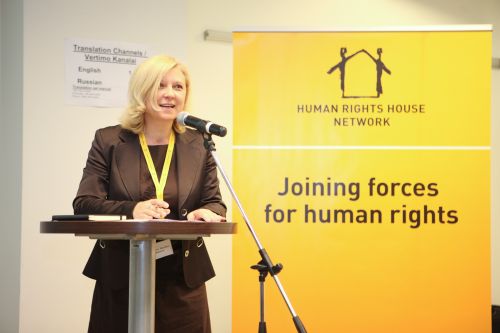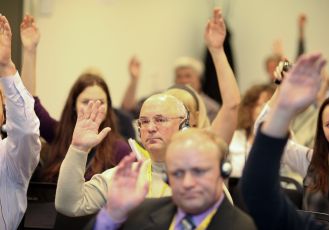The Belarusian Human Rights Defenders’ Forum was the last in a series of Human Rights House Network events taking place over the last week in Vilnius. During the forum, almost a hundred participants adopted a joint strategy and started to develop a joint plan of actions.
 “The human rights community of Belarus is ready now for a higher level of cooperation, – stated Ales Bialiatski, right, the leader of the Belarusian human rights organisation Viasna center in his speech.
“The human rights community of Belarus is ready now for a higher level of cooperation, – stated Ales Bialiatski, right, the leader of the Belarusian human rights organisation Viasna center in his speech.
Staying together
“Contrary to many other sectors of the Belarusian independent community, human rights defenders were able to stand together and stay in good relations with each other throughout all the recent years since the first Forum”, – Bialiatski noted. He and his colleagues outlined a range of positive achievements human rights defenders of Belarus have reached together.
Activists were able to keep human rights high on the agenda of Belarus-EU relations, resulting in many political prisoners being released or treated more humanely. Many human rights organizations in the country are also successful in holding joint events, campaigns, and other activities.
Surviving
Unfortunately, what made human rights defenders keep their solidarity were not only joint achievements, but just as much the deteriorating human rights situation in today’s Belarus. Working under conditions of ongoing harassment and persecution, they have developed some mechanisms to protect and support each other.
However, no breakthrough has been achieved in terms of developing normal working conditions. The government of Belarus is continuing to view human rights defenders as enemies rather than partners.
 Only the internal solidarity of the sector empowered it to survive repressions, stated Tatsiana Reviaka, left, the President of the Belarusian Human Rights House in Vilnius during the Forum.
Only the internal solidarity of the sector empowered it to survive repressions, stated Tatsiana Reviaka, left, the President of the Belarusian Human Rights House in Vilnius during the Forum.
Recalling again the first Forum in a freezing cold recreation center in Belarus, she said it was exactly the feeling of solidarity and responsibility that helped human rights defenders not to give up.
Pressing need for professionalism
Besides ‘solidarity,’ ‘professionalism’ was another frequently heard term during the event in Vilnius. The forum donors stressed that the human rights community of Belarus should be more open-minded, even amid growing repressions and losses, to accept younger people and to ensure the emergence of a new generation of human rights defenders.
In order to be able not only to survive, but also to serve the needs of public and actually defend their rights, training and higher level of professionalism is crucial. Education and training are standing high among the priorities of the common strategy and the action plan.
According to Bialiatski, there are about 600 people in today’s Belarus who can be referred to as human rights defenders. But estimated together with technical staff and volunteers, thousands of people belong to the human rights sector in Belarus, he added.
Documents:





